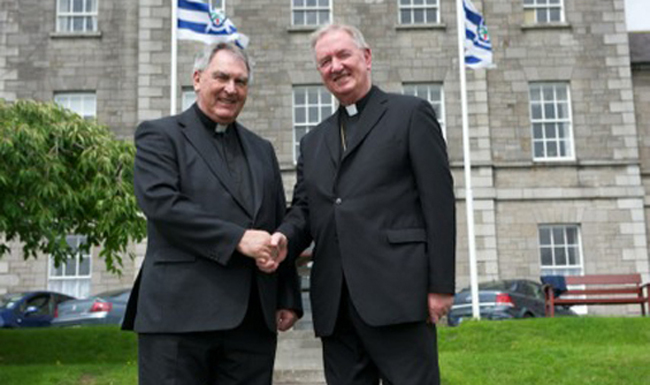

Media Briefing Bishop Joseph Duffy
Thank you for coming to this media briefing on the occasion of the
ordination of our new Bishop. I’m also happy that our Bishop-elect,
Mgr Liam Mac Daid, has been, among his many other responsibilities
in recent years, Press Officer for the Diocese.
He is no stranger to the media and understands the important role you play in today’s world. He knows that in our different roles in Church and media we approach the task of communication from different viewpoints, but he also knows that we have much in common. We share a search for the truth and the need to inform the general public on matters of human interest which affect the wellbeing of society. In view of all the preparation that has been going on over the past few weeks, the ordination next Sunday promises to be a colourful celebration as well as marking a memorable milestone in the journey of our Church community into the future.
I remember being asked when I became a bishop, many years ago, what does it feel like to be a bishop? Perhaps I am in a better position now than I was then to answer that question. Being the public face of a Church to which thousands of people in our locality subscribe, – even if not all with the same commitment – is a daunting place to be. It’s a role which is impossible for any one person to play without help from many people. The style of the role has of course changed radically over the past generation. It’s so much more difficult for the Bishop to get his message across these days. One example of this concerns the media. Where media direction has moved away from local management, Bishops have more difficulty in being heard and reported fairly.
That’s one good reason for welcoming you here today. I have personally every reason to thank our local media for their treatment of me over the years. I accept that what I have to say is not newsworthy most of the time, and, honestly, it’s not intended to be. But there are times when the positive message of the Christian gospel, the good news of the Gospel, needs to be heard by the general public and taken on board in the public interest. This is not about denying anybody the right to be critical, or the right to disagree. But it is about encouraging people to think positively, and, more importantly, to think in some kind of depth about serious issues of life and death. The Bishop cannot do this without a platform, in other words, without your help.
May I conclude with a paragraph from a homily I preached last week at Lourdes which sums up my case and which I hope may interest you.
“It’s easy to be critical of our Irish society today. There are those who are obviously the victims of our current economic crisis and who have good cause for complaining. Others complain that the current crisis is not only economic but social and cultural, that the real underlying problem in our society is individualism, lack of family and community support, that people in need are left to their own devices and for that reason lose hope and self-confidence when things don’t work out because they have nobody to turn to.
These are valid complaints; but there is of course no point in complaining, if that’s all we do. I put it to you that, in this negative scenario, the Christian message has something positive to offer. If we have come to believe in the reality of God’s love, then we must share that love. It’s up to us to give new heart to society. That’s the primary task of the Church, beginning with the ministers of the Church, the Bishop and the priests but extending to all believers, in our respective roles. We don’t do it alone or as individuals, but as a believing community together, with a positive lead from the local Bishop in what he says and does.
The principal public structures and institutions of society, for example, the Health system or the Education system, are, of course, the business of the State, funded by the taxpayer and staffed by a host of trained officers and officials. But the State, no matter how benevolent, can never, by itself, provide loving concern at the personal level. To imagine it can, is one of the common mistakes of our time. Now that’s where we come in as practising Catholics : it’s built into our faith that we accept personal interest in and concern for other people, not with the idea that we have a monopoly in this area or that we are somehow independent of the State, but simply as our unique contribution in building up a mature, caring and well-adjusted society.”
That, briefly, is how I see the basis of a Bishop’s involvement in the public life of the community, and, as such, with a valid claim on the positive attention of the media.
+Joseph Duffy
Bishop of Clogher
19 July 2010

